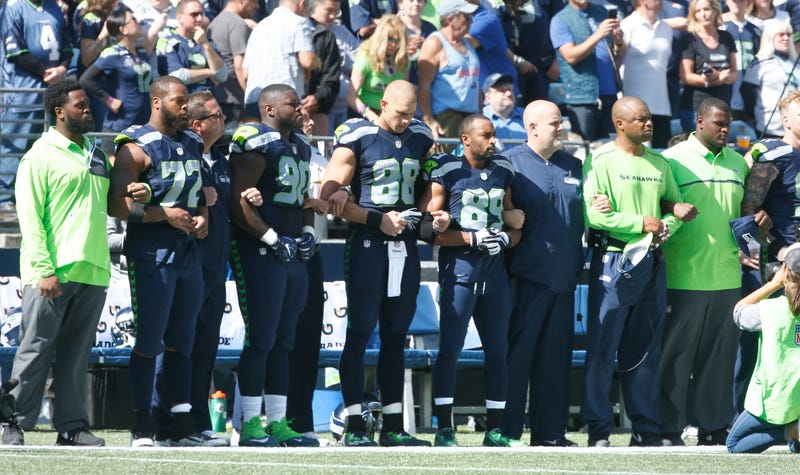
Ahead of their Sunday season opener, the Seattle Seahawks announced plans to link arms during the national anthem as a show of unity for an vague collection of causes, including “brotherhood” and “freedom.”
Three days before the game, Seattle wide receiver Doug Baldwin previewed this “demonstration of unity,” which I suppose is nice. He failed, however, to adequately explain what the team was unifying for or around.
On Instagram and Twitter, players shared a video describing their plan. It must be one of the few times a planned demonstration was preceded by a packaged social media rollout.
Baldwin narrates the video, explaining:
“We are a team comprised of individuals with diverse backgrounds,” Baldwin said during the video. “And as a team, we have chosen to stand and interlock arms in unity. We honor those who have fought for the freedom we cherish. And we stand to ensure the riches of freedom and the security of justice for all people. Progress can and will be made only if we stand together.”
Though little about this is specific or clear, I believe the Seahawks have essentially “all lives matter-ed” us with a sketchy proclamation of support for the fairly unimpeachable tenets of freedom and togetherness.
Further shading things was the occasion of the 15th anniversary of the September 11 attacks, which doubtlessly influenced this uninspiring show. It was only made worse by the decision to hype it as a moment of can’t-be-missed poignancy. (The Kansas City Chiefs also linked arms during the national anthem, but they did so without the fanfare and buildup.) In the video, you can also detect the team giving into the absurd notion that exercising a constitutional right is somehow disrespectful to the victims of 9/11.
While the Seahawks looked ready to play a game of red rover, four players from the opposing team, the Miami Dolphins, kneeled in protest. They were acting in solidarity with San Francisco 49ers quarterback Colin Kaepernick’s ongoing refusal to stand during the national anthem as a protest against the murders of black and brown Americans by the state agents tasked with protecting them.

The Seahawks’ actions on Sunday are far from those of Colin Kaepernick and the Dolphins players. Elsewhere, Kansas City Chief Marcus Peters raised his fist in protest. New England Patriots Martellus Bennett and Devin McCourty did the same.
The original plan was for the Seahawks to kneel as a team during the national anthem with their hands over the hearts—a somewhat contradictory set of actions, but certainly more meaningful than standing and linking arms. According to reports, plans changed after players who are “close with military” objected to kneeling. Doug Baldwin apparently caved to their sensitivities and offered the conciliatory alternative.
The demonstration, along with the way it came about, suggests to me that none of these people really know what they’re trying to say, nor do they really understand what Colin Kaepernick is protesting. Conflating a refusal to stand for the national anthem with being anti-military is the most painfully obtuse conclusion that could possibly be drawn from these actions.
Baldwin and his team’s display reads as even less impactful when you learn they surrendered to teammates who disagreed with their plan for reasons not rooted in facts. You don’t have to concede to wrongness. You don’t have to give in to people who don’t have the courage to stand up for you and your safety in the spirit of unity.
Kaepernick has made it clear that he is protesting police brutality—not the military, not the American flag, not the national anthem. This fact is uncomplicated. Perhaps what has made it so incendiary—and so counter in spirit from the Seahawks’s efforts— is how his position is self-evident in his protest. The American flag is not an independent entity, but a symbol for the ideals and civil liberties of our nation. By refusing to stand and kowtow to that symbol, he objects to the notion that “the land of the free” is applicable to all Americans.
The Seahawks instead opted for a somewhat self-congratulatory shout-out to brotherhood with little explanation as to what their brotherhood stands for. They risked nothing and sacrificed even less. The bravery of speaking out about a cause is in recognizing there might be ramifications and moving forward anyway because you know the message is necessary. This was the easy route: they knew they could make headlines while keeping lucrative sponsorships intact and avoiding the possibility of having to answer tough questions. Further, they fanned the flames of an already asinine discussion around the NFL protests by providing those who’ve vilified Colin Kaepernick with a perfect idol of respectability politics.
Along with linking their arms, the Seahawks pushed the innocuous hashtag #BuildABridge, which feels like a close relative to “I don’t see color” or some other empty term used to undermine honest conversations about race.
In Seattle’s video, Baldwin said progress can only be made if we all stand together—a statement largely unproven by history. While some still hope for the eventual mercy of our oppressors, others have already adjusted to the idea that justice and freedom will not come at the rehabilitated consciouses of white people. It will come when respect for black lives is demanded and when it is dangerous or expensive or deeply unpleasant to behave or suggest otherwise.
In a Facebook post about the team’s non-decision, Doug Baldwin quoted Martin Luther King Jr. I’ll quote another Nobel laureate. In his 1986 Peace Prize acceptance speech, Elie Wiesel said: “We must always take sides. Neutrality helps the oppressor, never the victim. Silence encourages the tormentor, never the tormented.”
The Seattle Seahawks did, indeed, do more than the many NFL teams who chose not to collectively link arms, but it almost didn’t matter. The gesture said nothing of significance. They didn’t pick a side on police brutality and racism. The Seahawks remained neutral, which is a lot like saying nothing at all.